10 Jul2020
By Jerrica Thurman
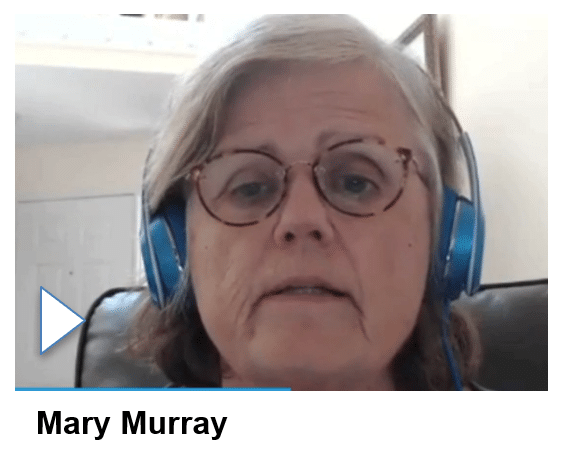
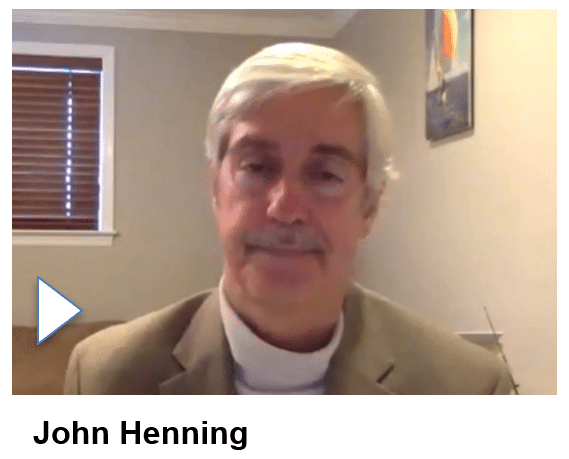 AACTE Board members John Henning and Mary Murray recently met with me to discuss why leadership and building partnerships matter during times of crises. In the videos, Henning and Murray shared the following:
AACTE Board members John Henning and Mary Murray recently met with me to discuss why leadership and building partnerships matter during times of crises. In the videos, Henning and Murray shared the following:
“A key rule of a leader during difficult times is to unify people and bring them together around the problem. By helping them move forward, things can get done rapidly, which is important when change is occurring quickly. With rapid change, it’s also important for leaders to stay organized,” said John Henning, dean of the school of education at Monmouth University. Henning is an experienced educational practitioner, researcher, and leader. His primary research interests include practice-based teacher education, teacher development, instructional decision-making, and classroom discourse. He is also an active scholar and researcher, with more than 50 publications. His fourth book, titled Building Mentoring Capacity in Teacher Education: A Guide to Clinically-Based Teacher Education, was released in 2019 by Routledge. He served for more than 20 years as a high school teacher. Henning obtained an M.Ed. in vocational education and a Ph.D. in educational psychology from Kent State University in Ohio. He received a B.S. in general agriculture from The Penn State University.
10 Jul2020
AACTE DEI Video: A Focus on Recruiting and Retaining Black and Hispanic/Latino Male Teachers
By Jerrica Thurman
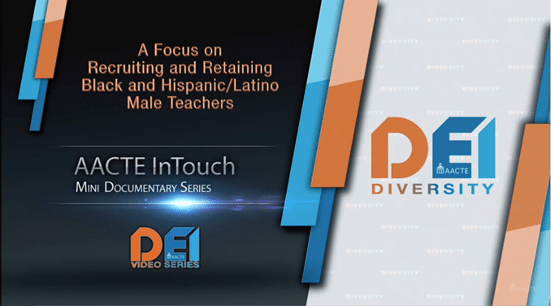
Ed Prep Matters features the “Revolutionizing Education” column to spotlight the many ways AACTE, member institutions, and partners are pioneering leading-edge research, models, strategies and programs that focus on the three core values outlined in the current AACTE strategic plan: Diversity, Equity, and Inclusion; Quality and Impact; and Inquiry and Innovation.
During this segment of the Diversity, Equity and Inclusion video series, AACTE members who participated in a 5-year study discuss their findings on ways to increase representation of men of color into the teaching profession. In “A Focus on Recruiting and Retaining Black and Hispanic/Latino Male Teachers,” researchers share the collective approaches campus-wide and across generations and disciplines required to effectively diversify the teacher pipeline.
02 Jul2020
By Beth Kubitskey and Anne Tapp Jaksa
Organized collective voices can make a difference. Over the past four years, the Michigan Association of Colleges for Teacher Education (MACTE) and other stakeholders have worked closely with the Michigan Department of Education (MDE) in the development and implementation of dramatic changes to the licensure guidelines and standards for PK-12 teachers. The Michigan Department of Education has moved to narrow certification bands to a model more inclusive of students’ needs. This “students first” teacher certification system focuses on the whole child and moving our state forward to becoming a top 10 education state in the next 10 years. It was created with input from educators, schools, educator preparation programs, and parents.
The EPP applications for the new elementary programs were to be submitted in November 2020 or April 2021. With the advent of the COVID-19 pandemic, institutions were finding it hard to meet these deadlines with the limited resources and reached out to MACTE for help. Through the process of leading collaboration with other organizations, dialog with state partners, and creating cohesive arguments with a specific request, MACTE was able to not only advocate for its EPP members, but for the candidates completing their programs.
MACTE responded by composing a letter to the director of the Michigan Department of Education’s Office of Educator Excellenc, requesting an extension of the application deadline to the next academic year as well as an extension of the sunset deadline for the elementary tests of the Michigan Test for Teacher Certification for the program that is being replaced. The Michigan Independent Educator Preparation Institution (MEIPI) and Michigan Public Education Deans (MPED) groups were also concerned with the impending timeline. MEIPI and MPED supported the MACTE’s proposal and joined us in signing this letter in support of this effort. As a collective we made the request to the Michigan Department of Education. The letter stressed the following.
02 Jul2020
By Ward Cummings
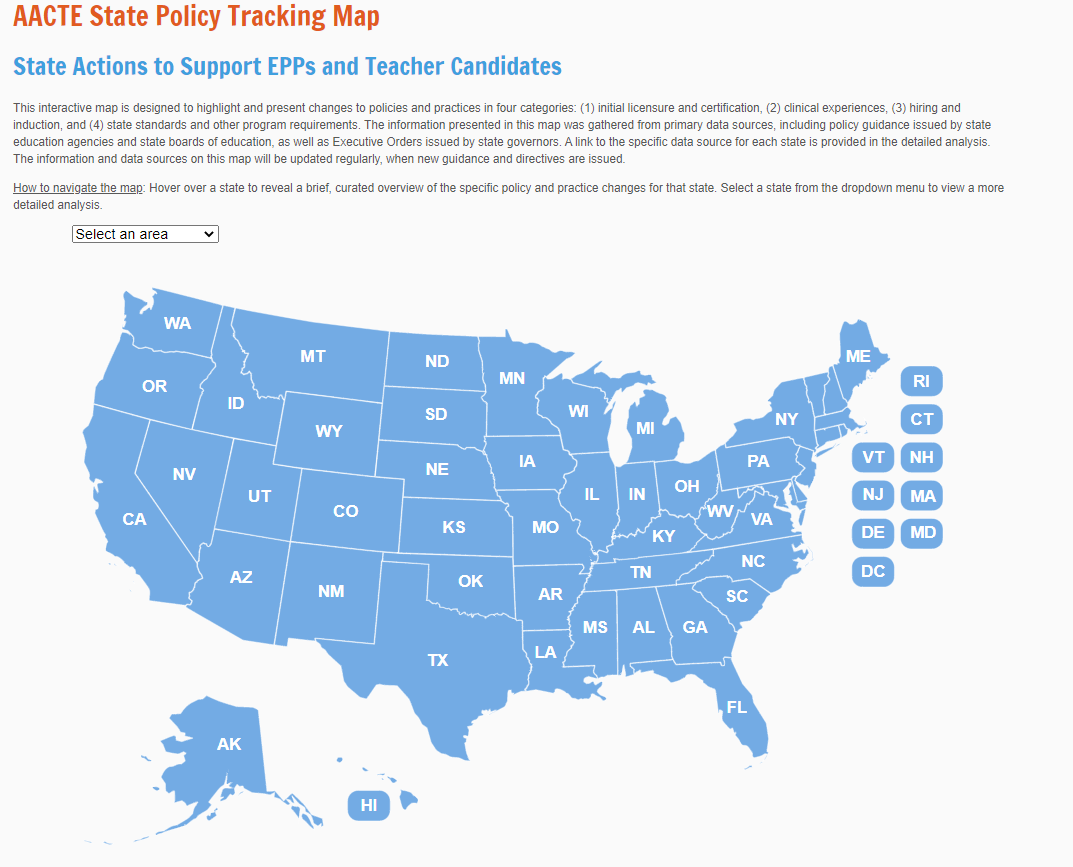 AACTE is excited to introduce its short tutorial video on how to navigate the new State Policy Tracking Map recently added to the AACTE COVID-19 Resource Hub. The easy to use map provides an analysis of state-issued guidance impacting standards and practice, new teacher induction, clinical practice and licensure. The tutorial offers a walkthrough of how to access and use the information provided in three formats: short bullet points, short-form distillations, and links to the original source material.
AACTE is excited to introduce its short tutorial video on how to navigate the new State Policy Tracking Map recently added to the AACTE COVID-19 Resource Hub. The easy to use map provides an analysis of state-issued guidance impacting standards and practice, new teacher induction, clinical practice and licensure. The tutorial offers a walkthrough of how to access and use the information provided in three formats: short bullet points, short-form distillations, and links to the original source material.
AACTE is among the first education associations to track and publish this information, which was collected from multiple sources: news reports, state press releases, executive orders issued by state governors and statements issued by state departments of education. AACTE also included information from state chapter leaders who participated in the shaping of EPP guidance in their state. As state legislatures begin to convene and engage on this issue, we will update the map to reflect their work.
The AACTE National Office has begun to analyze the information collected for the map and is compiling its findings in a soon-to-be released report. Teaching in the Time of COVID: State Recommendations for Preparation and New Teachers will summarize changes by EPPs in response to the COVID-19 public health crisis, seek opportunities for improvement, and propose recommendations to manage the pandemic successfully.
In the meantime, AACTE encourages you to visit the State Policy Tracking Map and invites you to share any questions, concerns, or updates you may have regarding the information presented on the map.
02 Jul2020
By Linda Minor

After careful consideration, AACTE has decided to transform the 2020 Washington Week conference into its inaugural virtual event. The in-person meeting has been canceled due to our concern about the health, well-being, and safety of our attendees and the coronavirus-related meeting and travel restrictions. We are excited to bring a virtual conference that will center on the same education and connections attendees experience at AACTE face-to-face meetings—from the comfort of your home. Take a moment to review the questions and answers we’ve prepared to acquaint you with this year’s Washington Week conference.
02 Jul2020
By Meghan Grenda

To ensure you have continual access to the many resources available to members, AACTE encourages you to renew your AACTE membership for 2021 today. Members who submit 50% of their dues by August 31, 2020 are eligible for a complimentary second registration to the 2020 Washington Week and 2020 Leadership Academy events. This means if you and a colleague are planning to attend one of these meetings, the second registration for the same event is free.
02 Jul2020
By Jacqueline Rodriguez
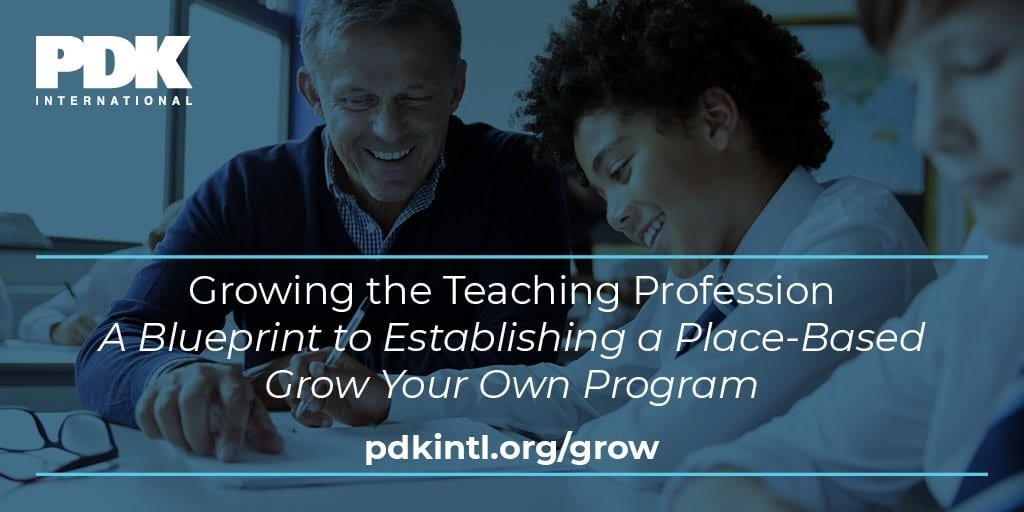
In collaboration with national experts including AACTE, Phi Delta Kappa International (PDK) has released a Blueprint to Establishing a Place-Based Grow Your Own Program to support growth in the teaching profession. According to PDK, “Grow your own programs recruit students from their current high school population to enter educator pathway programs. Districts and states then partner with local educator preparation programs to offer enrollment incentives to students, keeping them close to home so that they will return as teachers to the classrooms where they currently learn.”
As our nation’s schools are increasingly diverse, our teaching workforce must reflect the communities in which they serve. This step-by-step Blueprint provides the context and the guiding principles to support local leaders who seek to grow their own teaching pool from within their diverse eco-system.
02 Jul2020
By Jacqueline E. King, Ph.D.
AACTE invites proposals for a campus-based team to edit the Journal of Teacher Education (JTE) for a 3-year term, commencing with the January/February 2022 issue. Proposals must be submitted online by October 1. Qualified teams from schools, colleges, and departments of education at AACTE member institutions may apply.
Download the complete request for proposals, or enter the online submission site.
JTE, in continuous publication since 1950, is the premier journal for teacher education, providing a vital forum for considering practice, policy, and research in the field. Published five times a year, the journal reaches a worldwide audience and is regularly cited in new research. JTE is AACTE’s only journal, published in partnership with an editorial team based at a member institution and SAGE.
Michigan State University has served as editorial host of the journal since 2015, led by a team of four co-editors—Tonya Bartell, Dorinda Carter Andrews, Robert Floden, and Gail Richmond. Editors aim to achieve a strategic balance among the areas of pre-service and in-service teacher education practice, policy, and research, bringing those areas to bear on one another in challenging and productive ways. They offer a forum for diverse work of teacher education researchers (university and non-university based), teacher education practitioners (e.g., university, state, district, community college), and policy makers at all levels. Linking research and practice is paramount in their vision for JTE.
02 Jul2020
By Jacqueline E. King, Ph.D.
The AACTE Board of Directors recently created two new advisory committees to promote diversity in the educator workforce and among future leaders and scholars in educator preparation. These committees will be an integral part of fulfilling the strategic priority of diversity, equity, and inclusion outlined in AACTE’s strategic plan.
Advisory Committee on Educator Diversity
The purpose of this committee is to advise the AACTE staff and Board of Directors on current trends, issues, and programming needs related to advance diversity in educator preparation program faculty and candidates. The committee shall provide recommendations and feedback for program improvement that may pertain to the following:
01 Jul2020
By Nicole Dunn
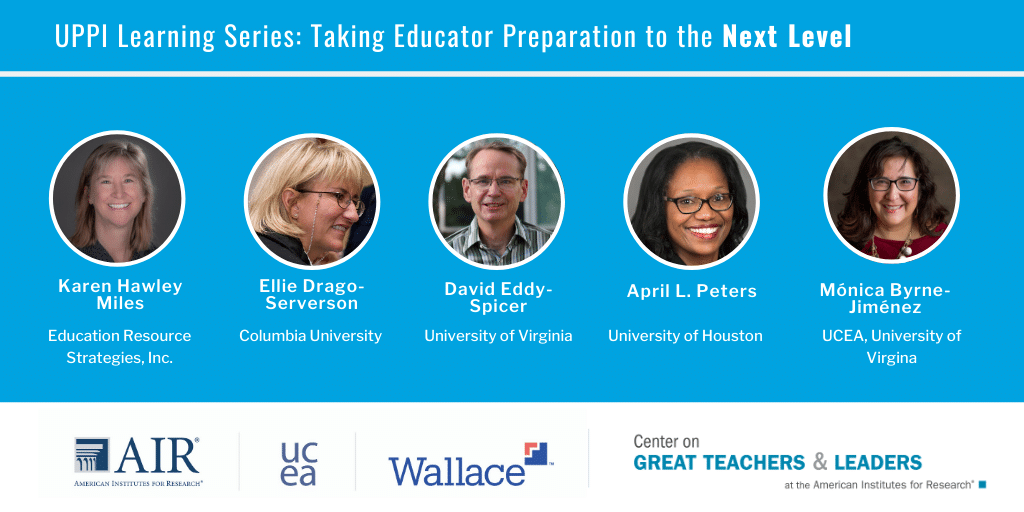
The Wallace Foundation’s University Principal Preparation Initiative (UPPI), which supports universities redesigning their principal preparation programs, has never been more important to students and communities. In addition to creating and sustaining efforts to improve equity and academic achievement for their students, school principals are navigating unprecedented changes to the way teaching and learning occurs.
AACTE invites you to join us as we continue to participate in the national conversation about principal preparation redesign through UPPI’s online learning series, “Taking Education Preparation to the Next Level.”
The five-session series, brought to you by The Wallace Foundation’s UPPI Network, in coordination with the University Council for Educational Administration (UCEA), will provide university/college principal preparation faculty within and beyond the UPPI network some important, collaborative tools and practical ideas on ways to support principal preparation and pipelines. Through the five-part series, national experts provide 45-minute, interactive sessions that address the following questions:
- How can principals lead schools focused on equity and academic improvement now and in the future?
- How can universities engage with partners to develop and sustain principal preparation programs to meet future challenges?
All are invited to attend the 45-minute interactive sessions facilitated by national experts. These sessions, described below, provide ideas and tools to advance leadership preparation, and foster improved collaboration between teacher and principal preparation.
30 Jun2020
By Monika Jo
 Face-to-face clinical field experience cancelled? Find out how teacher candidates can safely practice instructional strategies through virtual reality (VR) classrooms.
Face-to-face clinical field experience cancelled? Find out how teacher candidates can safely practice instructional strategies through virtual reality (VR) classrooms.
Join the AACTE and Mursion co-sponsored webinar, “Feasibility & Utility of Mixed Reality Simulations in Higher Education,” presented by guest speakers from AACTE and Kennesaw State University tomorrow, Tuesday, June 30 at 1:00 p.m. ET. The presenters will share their wealth of experience using mixed reality solutions and will engage in critical dialogue on the feasibility and utility of mixed reality simulations in higher education. You will discover how virtual simulations help teacher candidates develop high-leverage practices before entering real-world clinical experiences.
30 Jun2020
By Katrina Norfleet

In an article that appeared in “The Atlantic,” Pirette McKamey illustrated the many ways anti-racist teachers make black students central to the success of their own teaching. “This is a paradigm shift: Instead of only asking black students who are not doing well in class to start identifying with school, we also ask teachers whose black students are not doing well in their classes to start identifying with those students,” said McKamey.
McKamey is the first black principal of Mission High School in San Francisco, and has taught high-school English and history for 26 years. From 2005 to 2016, she co-founded and co-led the anti-racist teaching committee at Mission High. In the article, she offers a firsthand account of students’ level of success when their academic strengths are overlooked and marginalized by educators who do not respect the intellectual contributions of black students versus those who do.
Read the full article.
30 Jun2020
By Trine University
This article originally appeared on the Trine University News site and is reprinted with permission.
Three Trine University students from the Franks School of Education have been recognized as Outstanding Future Educators by the Indiana Association of Colleges for Teacher Education (IACTE).
Graduating seniors Cassi Wyse, an elementary education major from Archbold, Ohio, Mackenna Kelly, a mathematics education major from Angola, Indiana, and Connor Moore, a health and physical education major from Indianapolis, were scheduled to be honored with other students from across the state at the Outstanding Future Educators Banquet in Carmel, Indiana, on April 3. However, the event was canceled due to the COVID-19 outbreak.
“Though I’m heartbroken we were unable to join together to recognize these future educators in the way they deserved, the lack of a formal celebration in no way diminishes their accomplishments as teacher education students at Trine and the excellence they bring to their teaching careers,” said Anthony Kline, dean of the Franks School of Education. “We are proud of their effort here and look forward to their success as professional educators.”
Each teacher preparation program in the state recognized teacher candidates with the honor.
29 Jun2020
By Jane E. West

This blog post is written by AACTE consultant Jane West and is intended to provide updated information. The views expressed in this post do not necessarily reflect the views of AACTE.
Re-opening Schools During COVID-19: Will the Federal Government Help?
The topic of reopening schools is demanding attention at all levels of government—both for K-12 and higher education. The questions far outnumber the answers and the keywords seems to be flexibility and local decision-making. With governors, public health agencies, state and local school leaders, parents, and teachers all weighing in, the web of perspectives is complex. Finding a path to ensure public safety, equity and access to effective education is the challenge of the day. And finding the money to do what needs to be done—and in the midst of a polarizing election cycle—is looking like a herculean task.
This week, the House Committee on Education and Labor held its second hearing related to education and the pandemic, Inequities Exposed: How COVID-19 Widened Racial Inequities in Education, Health and the Workforce. In his testimony about education, John B. King Jr, president and CEO of the Education Trust, highlighted ongoing inequities in both K-12 and higher education and how COVID-19 has exacerbated them. He urged the federal government to act and recommended the following provisions for the next COVID-19 relief bill:
26 Jun2020
By Rodney Robinson
This article originally appeared on Rodney Robinson’s blog and is reprinted with permission.
Yesterday, I woke up to a country and a city in crisis. I had text messages from former students who are now in their late 20’s looking for guidance and advice. Teachers who are close friends and some strangers have asked for my advice on what they should be doing. I did my best to calm their fears and try to help them channel their anger, anxiety, and aggression into a more impactful way but soon became overwhelmed at the sheer hopelessness of the situation. Like everyone, I’ve been sulking and processing the events of the past week.
Politicians, the media, and pundits love to use the term systemic racism to describe what is going on to generalize the problems of being black in America. While this is true, we must address the causes of systemic racism and not allow them to generalize and describe the system they are complicit in maintaining. We must push them to make systemic racism more than a buzzword. We must push them to define systemic racism and demand solutions that provide actionable change and implementation which most aren’t willing to do because they must sacrifice their comfort and position.
Peaceful protests and uprisings are not inspired just from the frustration of a lynched unarmed Black man. This is the frustration that comes from an inherently racist society that was built to subjugate Black people. According to Ta-Nehisi Coates, the “destruction is merely the superlative form of a dominion whose prerogatives include frisking, detainings, beatings, and humiliations.” It also comes from lack of safe, affordable neighborhoods, an education system that punishes black and brown boys and girls at rates 3-4 times higher than white kids, and a criminal system that stalks and preys on black bodies limiting their opportunities for physical and financial freedom.

 AACTE Board members John Henning and Mary Murray recently met with me to discuss why leadership and building partnerships matter during times of crises. In the videos, Henning and Murray shared the following:
AACTE Board members John Henning and Mary Murray recently met with me to discuss why leadership and building partnerships matter during times of crises. In the videos, Henning and Murray shared the following:


 AACTE is excited to introduce its short
AACTE is excited to introduce its short 



 Face-to-face clinical field experience cancelled? Find out how teacher candidates can safely practice instructional strategies through virtual reality (VR) classrooms.
Face-to-face clinical field experience cancelled? Find out how teacher candidates can safely practice instructional strategies through virtual reality (VR) classrooms.
